

Last week was a very busy one as The English Apple Man joined his young friends on the Under 40's Conference in Benelux.
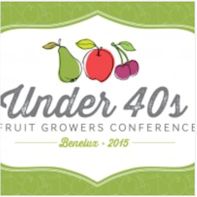
Benelux is a union of Belgium, the Netherlands and Luxembourg. The union's name is formed from joining the first two or three letters of each country's name and was first used to name the customs agreement that initiated the union. It is now used in a more general way to refer to the geographic, economic and cultural grouping of the three countries.
Fruit growing in Holland and Belgium
The Netherlands has just under 7,500 hectares of apples and just over 8,000 hectares pears, while Belgium has 7,000 hectares of apples and 7,500 hectares of pears. By comparison, in the UK we grow around 5-6,000 hectares of dessert apples and 1,000 hectares of pears.
This year's Conference compromised 54 delegates; growers, technologists, scientists and sponsors.
Arriving in Calais on the shuttle at 10.30am (French time) we set off in our very modern Coach driven by 'Vince' a driver of considerable 'continental' driving experience and endowed with a 'dry sense of humour' - the coach belonging to BuzzLines based in Lympne in Kent.
En route to our Hotel in the City of Roermond in Holland, we stopped at - 'Surprise Surprise' a Belgian Brewery, where the star attraction 'Duvel' a very special Belgian Beer and a very welcome spread of lunch was followed by a tour of the brewery.
For a thorough overview of the Duvel Moortgat Brewery click on Duvel Brewery and look at the Video of Duvel history; Click on 1871 and access Video.
'Theater Hotel de Oranjerie at Reormond'
Our home for three nights was this superb hotel with its integral Theatre de Oranjerie, which was there long before being incorporated into a new hotel.
Sponsors
Without the generosity of the sponsors, the U40's Conferences would not be possible. From the very first U40 Conference in 1967, the support of sponsors has been integral to the success of this important learning and networking opportunity for our young growers.
The full complement of U40 2015 Sponsors totals 30; on our first evening sponsors who had traveled with the U40's, presented their company credentials.
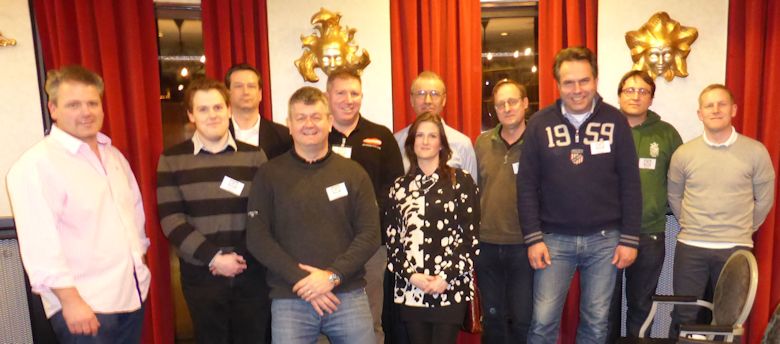
Pictured above - L - R Simon Fitch ICA/STS - Matthew Goodson Certis UK - Andrew Low Plant Impact - Scott Garnett Everiss - Andrew Gough Lallemand - Jane Cusack Agrovista - Peter Newman Bayer Cropscience - Colin Carter Landseer - Rob Geevers Plant Impact - Jasper Hubert Koppert - Simon Percival Total Worldfresh
On Thursday, our first full day we visited a tree nursery, a cherry grower and Limberger Research Station.
Fleuren Tree Nursery
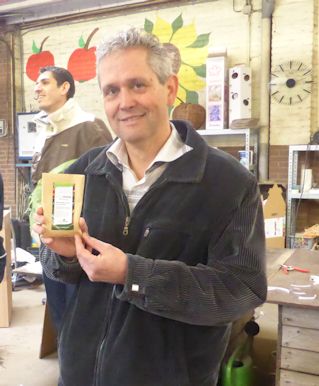 Fleuren is one of the largest fruit tree nurseries in the Netherlands. Fleuren does more than just supply premium quality fruit trees to fruit growers. The nursery is also responsible for creating new tree shapes and planting systems, which has given them a leading role in the market - where they occupy a prominent position in the European supply chain; Fleuren supply apple, pear, cherry and plum trees throughout Europe.
Fleuren is one of the largest fruit tree nurseries in the Netherlands. Fleuren does more than just supply premium quality fruit trees to fruit growers. The nursery is also responsible for creating new tree shapes and planting systems, which has given them a leading role in the market - where they occupy a prominent position in the European supply chain; Fleuren supply apple, pear, cherry and plum trees throughout Europe.
Fleuren General Manager - Sjaak Walreven presented an overview of Fleuren History and some of the specific innovations the Fleuren Nursery has been responsible for including; Knip Trees, Quince Eline pear rootstock, Mini Trees and Sweet Cherry varieties.
Among the many successes, Fleuren introduced Quince Eline, the first pear rootstock that is truly frost-resistant offering vigour comparable with that of C quinces and even higher production. A rootstock that produces good-looking, smooth pears and is moreover very compatible with many pear varieties (e.g. Conference, Abate Fetel, B.A.Lucas and Sweet Sensation). After many years of research and development this rootstock is now available to fruit-tree growers and fruit producers.
Q-Eline was named after Eline, the daughter of Han Fleuren, Boomkwekerij Fleuren's owner, and his wife Corine.
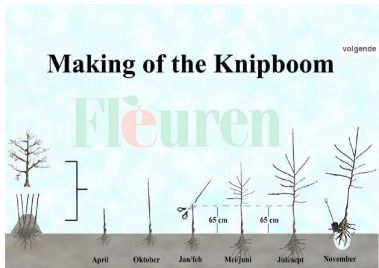 The first "knip-tree" was invented by Karel Fleuren at the end of the 1970; Knip Trees have become the standard for trees bought by apple growers allowing earlier cropping.
The first "knip-tree" was invented by Karel Fleuren at the end of the 1970; Knip Trees have become the standard for trees bought by apple growers allowing earlier cropping.
After Sjaak's introduction to the Fleuren Nursery history, owner Han Fleuren entertained U40 delegates with his 'life and business' philosophy; recognising his father kept tight control of all aspects of the business, Han set out to engage personnel capable of running each department of the Fleuren business without his daily input. Han however sets the business strategy and told us that although the prices of apples and pears are poor (primarily due to the Russian Boycott of EU top fruit) we should look upon this is an 'opportunity' in fact Han's whole take on life is one of being positive and seeking opportunities from the challenges we face.
Both Han and Sjaak see the increasing prosperity in Asia as the saviour of EU top fruit growers.
As we toured the Nursery activities, Han continued to entertain us with his humourus asides; he could 'no doubt' earn a living on stage as an entertainer with his observations on life and opportunities. In the picture (left) Han is holding a packet of 'insect poo' packaged and offered to buyers of Mini Trees for easy nutrition.
Mini Trees
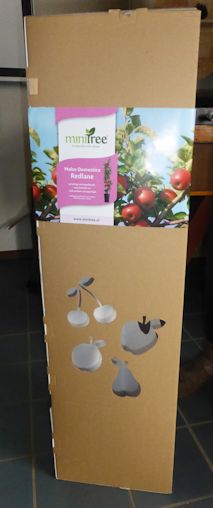
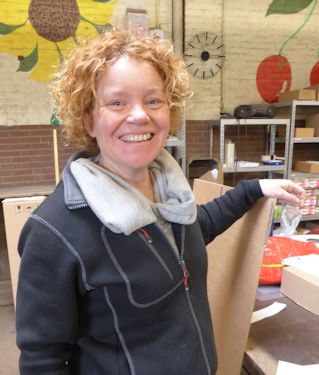 Introducing his wife Corine and her Mini Trees, Han views the availability of Mini Trees for amateur gardeners as an opportunity to increase awareness and 'consumption' of apples. Asked by a Dutch friend - 'if gardeners buy Mini Trees won't they buy less apples? NO once they taste the quality of apples from their own trees, the desire will be to eat more apples and increase overall consumption!
Introducing his wife Corine and her Mini Trees, Han views the availability of Mini Trees for amateur gardeners as an opportunity to increase awareness and 'consumption' of apples. Asked by a Dutch friend - 'if gardeners buy Mini Trees won't they buy less apples? NO once they taste the quality of apples from their own trees, the desire will be to eat more apples and increase overall consumption!
Fleuren introduced Mini Trees with Hans wife Corine responsible for this separate business, which was founded in 2010 to develop quality trees for the amateur market. These very dwarf trees are suitable for small gardens and pots. From an initial start with a low anticipation of demand, Corine Fleuren told us the response was way beyond expectation. Corine anticipated selling 500 in the first year; that became 5,000!
In 2012 Corine's Mini Trees were displayed at Floriade; an international exhibition of flowers and gardening, held every 10 years in the Netherlands.Two million + visitors attended the exhibition and Mini Trees gained much publicity.
Demand has increased considerably over the past 3 years and is developing Internationally.
Currently there are 'country specific' websites for Holland and Belgium with UK 'in the planning stage and USA to follow.
To get an idea of how the sales are managed; Click on Mini Trees
Amateur growers may not appreciate the complexity and expense of producing 'high quality' trees for professional fruit growers. Keeping costs down means embracing mechanisation, root-stocks are planted with mechanical assistance, lifted by machine, and trees also lifted mechanically when the trees are ready to be shipped to the growers. Cold stores to hold trees in while awaiting dispatch are also part of the equation.
During our visit to Fleuren we visited the room where 'Bench Grafting' was in process; the staff were busy preparing cherry root-stocks and cherry graft-wood for 'bench grafting' and we saw the process from beginning to end.
Below pictures of the 'Bench Grafting' Process
Root-stocks arrive in the grafting room and are prepared by cutting to the required length.
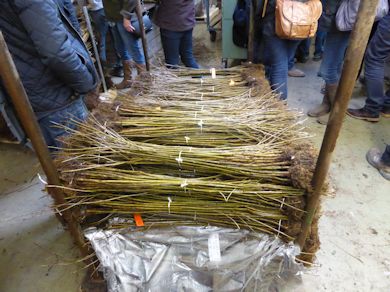
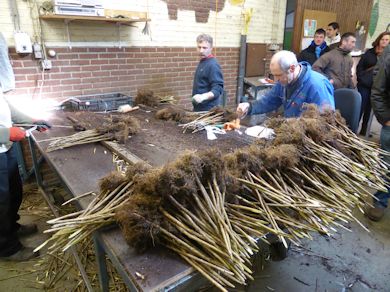
The next stage in the process requires selection of suitable scion wood for grafting;
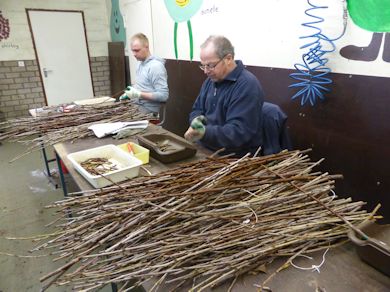

The bench grafting technique requires the 'grafter' to pick a piece of scion wood that is equal to the rootstock in thickness; once selected he/she will bind the two together with a grafting tape.
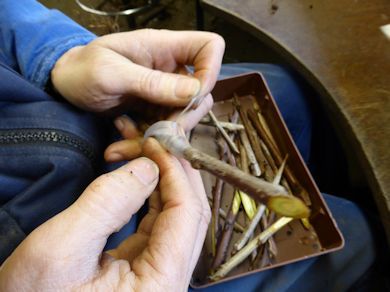
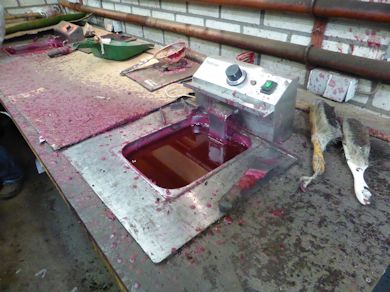
To ensure the tip of the scion does not dry out, the tips is dipped in hot wax. Once the process is complete the new 'baby tree' is ready for planting out in the nursery.
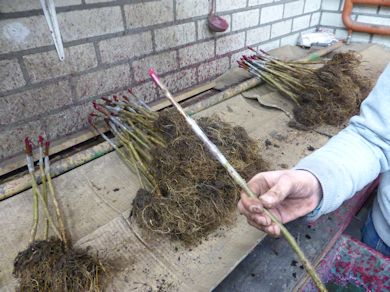
.jpg)
Below: Kent grower Ben Bardsley presented Han and Sjaak with a commemorative thank you present from the U40's - Later we visited the Fleuren Cold Store which is capable of holding one million trees for up to seven months.
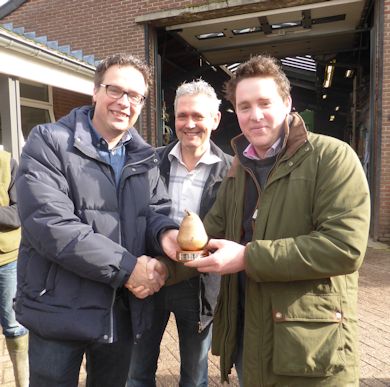
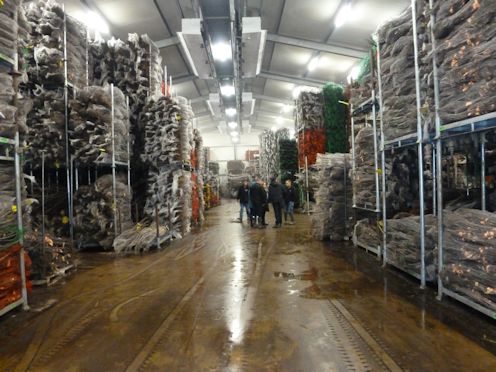
Click on Fleuren to visit the company website.
Cherries and Pears
After lunch at Fleuren, we drove to Rob Jannsen's farm at Deest where he grows Cherries and Pears.
Rob Janssen grows sweet cherries (including Cerisa) and pears. This is a family run business, who have been growing fruit for over 50 years. The cherries are Ecolabel certified, the first in Europe. The farm prides itself on letting cherries ripen as long as possible before harvest for a better flavour. Here we learnt about the new Cerisa cherry a limited edition variety in 2014. Cerisa cherries are very large with a diameter of 34 + mm, weighing 17 to 21 grams each.
Below a Panoramic picture of Rob Jannsen's young Cherry orchard

Rob Jannsen explains his growing philosophy to U40 delegates
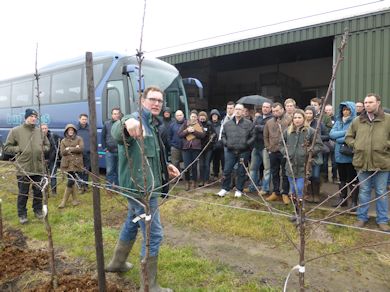
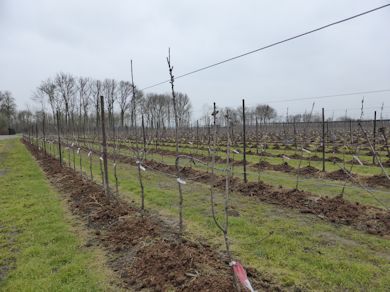
Cherries grown under permanent covers require strict control of the tops; removing growth from the tops enables the lower fruiting branches 'light and energy' - the Cherry trees on the right have their covers removed after harvest
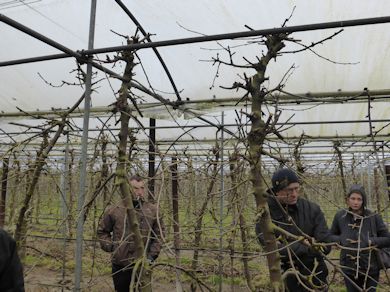
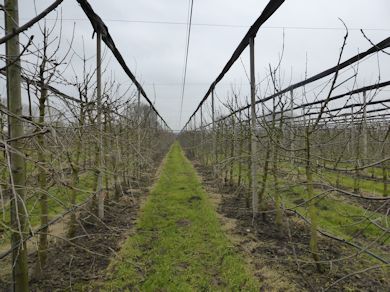
SWD is a threat to all Cherry growers and Rob Jannsen recognises the importance of good hygiene by removing leaf litter from the orchard; first it is swept into the alley, then removed.
.jpg)

Like most Dutch and Belgian Pear growers, Jan grows Conference and his chosen system is the Vee system
To view the Jannsen Cherry business and their specialist marketing - Click on Rob Jannsen
Visit to Limberger Research Station
PPO focuses on co-innovations with partners from the sectors of agriculture, science, business and government. Analyzes together with clients PPO questions about cultivation and management, and translates these into applied research and development programs.
Applied Plant Research (PPO) is part of Wageningen University. It conducts research through innovations with partners from the different agricultural sectors, sciences, industry and government. The Dutch fruit sector is an international front runner. Innovations developed by PPO are contributing to this result. Research is ongoing in fields such as labour-saving techniques, mechanisation, nutrition, cultivation, harvest and storage of all the fruit types grown in the Netherlands.
FruitConsult
Fruitconsult is a private consultancy agency for fruit growers (apple, pear, cherry). Most of their clients are situated in the Netherlands, Belgium, Germany and Italy. They advise growers on fertilisation, plant protection and culture.
After a short presentation by Dirk Van Hees highlighting the pear rootstock trail, comparing Quince C, Quince Adams and Quince Eline and the importance of low temperature resilience; in 2011/2012 temperatures dropped to -25c and many trees died due to frozen root-stocks.
Quince Eline demonstrated an ability to survive the low temperatures and the chart below indicates the difference between root-stocks.
Below a comparison picture of low temperature damage to different pear root-stocks; Kwee (Quince) Eline is the most resistant.
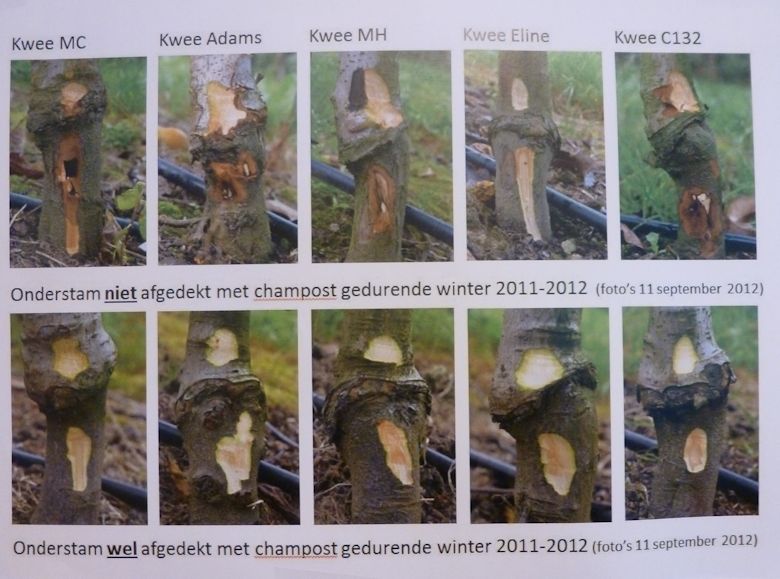
Dirk van Hees of Fruit Consult explaining the virtues of the different root-stocks.
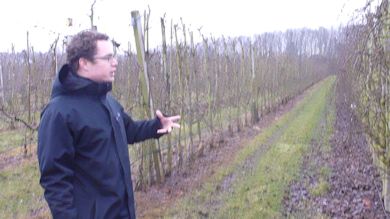
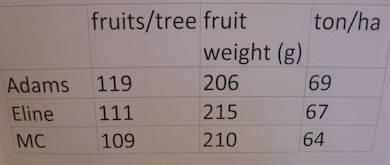
The 2015 Under 40's Delegates pose outside the Theatre de Oranjerie Hotel at Roermond
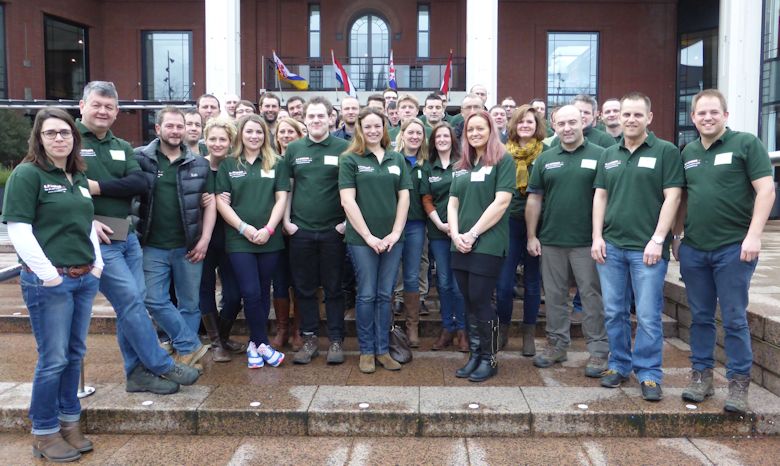
In next week's Journal The English Apple Man will report on Day 2 of the Under 40's 2015 Conference
Take care
The English Apple Man